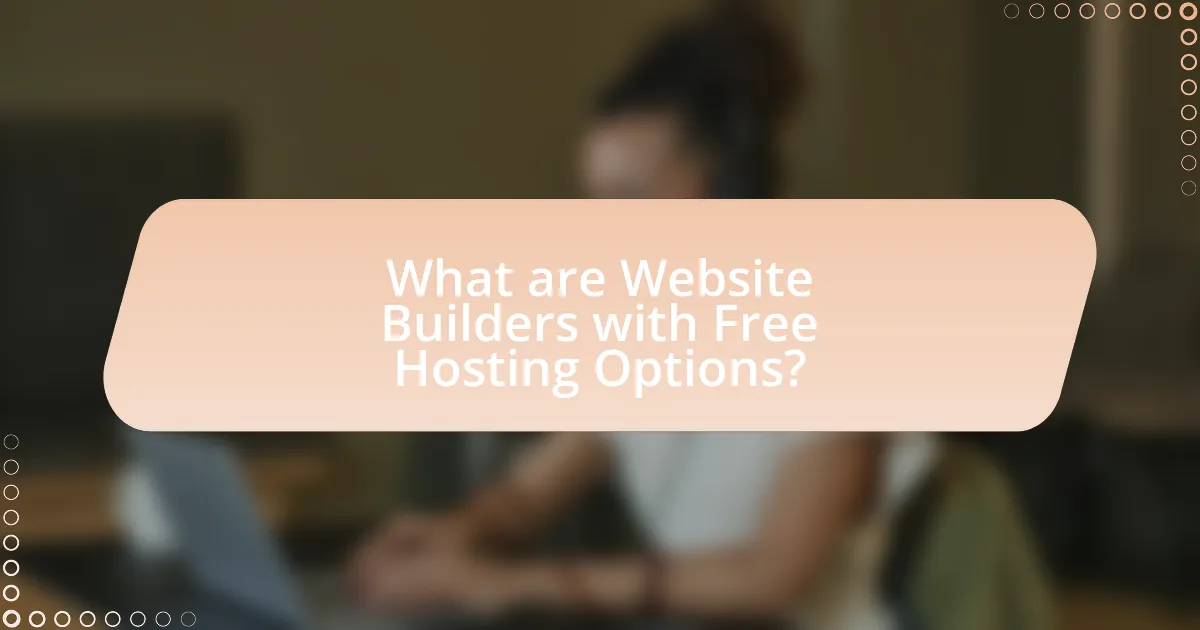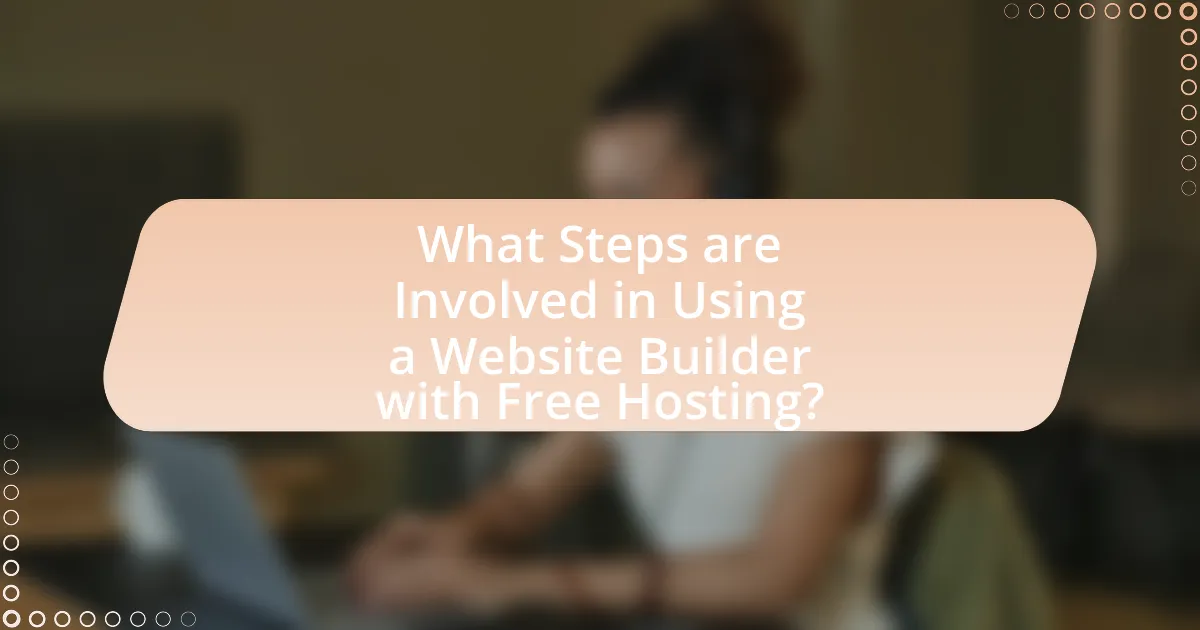Website builders with free hosting options are platforms that enable users to create websites without incurring hosting fees, with popular examples including Wix, Weebly, and WordPress.com. These builders provide user-friendly interfaces, customizable templates, and essential features for website creation, making them accessible for individuals and small businesses. The article explores how these website builders function, the advantages and limitations of free hosting, and offers guidance on selecting the right platform. Additionally, it outlines best practices for building a website, optimizing for search engines, and enhancing user experience, while also addressing common issues and security measures associated with free hosting services.

What are Website Builders with Free Hosting Options?
Website builders with free hosting options are platforms that allow users to create websites without incurring hosting fees. Examples include Wix, Weebly, and WordPress.com, which provide users with templates and tools to design their sites while hosting them on their servers at no cost. These platforms typically offer limited features in their free versions, such as storage space and bandwidth, but they enable users to establish an online presence without financial investment. According to a 2021 survey by Statista, over 40% of small businesses utilize website builders for their online presence, highlighting the popularity and accessibility of these tools.
How do website builders function?
Website builders function by providing users with a platform to create websites without needing extensive coding knowledge. They offer a user-friendly interface that typically includes drag-and-drop features, pre-designed templates, and customizable elements, allowing users to design their sites visually. Most website builders also integrate hosting services, meaning that once a website is created, it can be published online directly through the platform. This streamlined process enables individuals and businesses to establish an online presence quickly and efficiently, often with minimal costs involved.
What features do website builders typically offer?
Website builders typically offer features such as drag-and-drop interfaces, customizable templates, mobile responsiveness, SEO tools, and e-commerce capabilities. These features enable users to create websites without extensive coding knowledge. For instance, drag-and-drop interfaces simplify the design process, while customizable templates allow for personalization. Mobile responsiveness ensures that websites function well on various devices, and SEO tools help improve search engine visibility. E-commerce capabilities enable users to set up online stores, facilitating transactions directly through their websites.
How do free hosting options differ from paid ones?
Free hosting options differ from paid ones primarily in terms of features, performance, and support. Free hosting typically offers limited storage, bandwidth, and functionality, often displaying ads on user sites, while paid hosting provides more resources, enhanced performance, and customer support. For instance, paid hosting services often include features like custom domain names, SSL certificates, and better security measures, which are usually absent in free hosting plans. Additionally, according to a 2021 survey by HostingAdvice, 70% of users reported that paid hosting significantly improved their website’s loading speed and reliability compared to free options.
Why choose a website builder with free hosting?
Choosing a website builder with free hosting is advantageous because it eliminates the need for separate hosting expenses, making it cost-effective for individuals and small businesses. This approach allows users to create and manage their websites without incurring additional financial burdens, which is particularly beneficial for those with limited budgets. According to a survey by Clutch, 30% of small businesses cite cost as a primary factor in their website development decisions, highlighting the importance of affordable solutions.
What are the advantages of using free hosting?
The advantages of using free hosting include cost savings, ease of access, and basic functionality for personal or small projects. Free hosting allows users to create and manage websites without financial investment, making it ideal for beginners or those testing ideas. Additionally, many free hosting services offer user-friendly interfaces and templates, enabling quick setup and deployment. According to a survey by HostingAdvice, over 60% of new website owners start with free hosting to minimize initial expenses while learning web development skills.
What limitations should users be aware of?
Users should be aware that free hosting options often come with limitations such as restricted bandwidth, limited storage space, and the presence of advertisements on their websites. These constraints can hinder website performance and user experience, as many free hosting services impose caps on data transfer and storage, which can lead to slow loading times and potential downtime. Additionally, users may not have access to advanced features or customer support, which are typically reserved for paid plans. According to a study by HostingAdvice, 70% of users reported dissatisfaction with the limitations of free hosting services, highlighting the importance of understanding these restrictions before committing to a platform.

How to Select the Right Website Builder with Free Hosting?
To select the right website builder with free hosting, evaluate the features, ease of use, customization options, and support services offered by various platforms. Popular website builders like Wix, Weebly, and WordPress.com provide user-friendly interfaces and essential tools for creating websites without coding knowledge. For instance, Wix offers a drag-and-drop editor and a variety of templates, while WordPress.com provides extensive plugin options for added functionality. Additionally, consider the limitations of free hosting, such as storage space and bandwidth, as well as the presence of ads on your site. Research user reviews and comparisons to ensure the chosen builder meets your specific needs and preferences.
What factors should be considered when choosing a website builder?
When choosing a website builder, factors such as ease of use, customization options, pricing, and customer support should be considered. Ease of use ensures that users can create and manage their websites without extensive technical knowledge, which is crucial for beginners. Customization options allow users to tailor their websites to meet specific needs and branding requirements, enhancing user experience. Pricing is important as it affects the overall budget; many builders offer free plans, but understanding the limitations of these options is essential. Customer support is vital for resolving issues quickly, and reliable support can significantly impact user satisfaction. According to a survey by Website Builder Expert, 70% of users prioritize ease of use when selecting a website builder, highlighting its importance in the decision-making process.
How important is ease of use in a website builder?
Ease of use is critically important in a website builder, as it directly impacts user experience and the ability to create functional websites efficiently. A user-friendly interface allows individuals, regardless of technical skill, to navigate the platform easily, reducing the learning curve and enabling quicker project completion. According to a survey by the Content Marketing Institute, 70% of users prioritize ease of use when selecting a website builder, indicating that a straightforward design can significantly influence user satisfaction and retention.
What role do templates and design options play?
Templates and design options serve as foundational tools in website builders, enabling users to create visually appealing and functional websites without extensive coding knowledge. They provide pre-designed layouts and customizable elements that streamline the web development process, allowing users to focus on content rather than design intricacies. Research indicates that websites utilizing templates can reduce development time by up to 50%, making them an efficient choice for individuals and small businesses seeking to establish an online presence quickly.
Which website builders offer the best free hosting options?
Wix, Weebly, and WordPress.com offer the best free hosting options among website builders. Wix provides a user-friendly interface with a drag-and-drop feature, allowing users to create websites without coding knowledge. Weebly also offers a simple drag-and-drop builder and includes e-commerce capabilities even in its free plan. WordPress.com, while slightly more complex, offers extensive customization options and a large selection of themes. Each of these platforms supports free hosting, making them accessible for users looking to build websites without upfront costs.
What are the top-rated website builders with free hosting?
The top-rated website builders with free hosting include Wix, Weebly, and WordPress.com. Wix offers a user-friendly drag-and-drop interface and a variety of templates, making it suitable for beginners. Weebly provides a straightforward setup and e-commerce capabilities, appealing to small businesses. WordPress.com allows for extensive customization and is ideal for bloggers and content creators. Each of these platforms has been recognized for their ease of use and functionality, making them popular choices among users seeking free hosting options.
How do user reviews influence the choice of a website builder?
User reviews significantly influence the choice of a website builder by providing potential users with insights into the experiences of others. These reviews often highlight the strengths and weaknesses of various builders, allowing users to make informed decisions based on real-world feedback. For instance, a survey by BrightLocal found that 91% of consumers read online reviews, indicating their importance in shaping perceptions and choices. Positive reviews can enhance a builder’s credibility, while negative reviews can deter users, directly impacting the builder’s market success.

What Steps are Involved in Using a Website Builder with Free Hosting?
To use a website builder with free hosting, follow these steps: First, select a website builder that offers free hosting, such as Wix, Weebly, or WordPress.com. Next, create an account by providing your email and setting a password. After account creation, choose a template that suits your website’s purpose. Then, customize the template by adding text, images, and other elements using the builder’s drag-and-drop interface. Once customization is complete, preview your website to ensure it appears as desired. Finally, publish the website, making it accessible online through the free hosting service provided by the builder. These steps are validated by the user-friendly processes established by popular website builders, which facilitate easy website creation without technical expertise.
How do you get started with a website builder?
To get started with a website builder, first choose a website builder platform that suits your needs, such as Wix, Weebly, or WordPress.com. After selecting a platform, create an account by providing your email address and setting a password. Once registered, you can select a template that aligns with your vision for the website. Most website builders offer drag-and-drop functionality, allowing you to customize the layout and content easily. Finally, publish your website by following the platform’s instructions, which typically involve clicking a “Publish” button. This process is supported by the fact that platforms like Wix and Weebly have user-friendly interfaces designed for beginners, making it accessible for anyone to create a website without coding knowledge.
What is the process for signing up for a free hosting account?
To sign up for a free hosting account, visit the website of a hosting provider that offers free plans, such as InfinityFree or 000webhost. After selecting the free hosting option, create an account by providing your email address and setting a password. Confirm your email address through a verification link sent to your inbox. Once verified, log in to your account, choose a domain name (often a subdomain), and complete any additional setup steps required by the provider. This process is standard across many free hosting services, ensuring users can quickly establish their online presence without financial commitment.
How do you select a template and customize your website?
To select a template and customize your website, first, browse through the available templates offered by the website builder, focusing on designs that align with your brand and functionality needs. After selecting a template, use the customization tools provided by the builder to modify elements such as colors, fonts, images, and layout to suit your preferences. Many website builders, like Wix and WordPress, offer drag-and-drop interfaces and pre-built sections, allowing for easy adjustments without coding knowledge. This approach ensures that the final design reflects your vision while maintaining usability and responsiveness across devices.
What are the best practices for building a website using a builder?
The best practices for building a website using a builder include selecting a user-friendly platform, utilizing templates effectively, ensuring mobile responsiveness, optimizing for SEO, and regularly updating content. User-friendly platforms like Wix or Squarespace simplify the design process, allowing users to focus on content rather than technical details. Effective use of templates can enhance visual appeal and maintain consistency across pages. Mobile responsiveness is crucial, as over 50% of web traffic comes from mobile devices, making it essential for user experience. SEO optimization, such as using relevant keywords and meta tags, improves visibility in search engines. Regular content updates keep the website relevant and engaging for visitors.
How can you optimize your website for search engines?
To optimize your website for search engines, implement on-page SEO techniques, including keyword research, meta tags, and quality content creation. Keyword research identifies relevant terms that potential visitors use, allowing you to incorporate these strategically into your content. Meta tags, such as title tags and meta descriptions, provide search engines with essential information about your pages, improving click-through rates. Quality content, which is informative and engaging, not only attracts visitors but also encourages backlinks, enhancing your site’s authority. According to a study by Backlinko, websites with higher-quality content tend to rank better in search engine results, demonstrating the importance of these optimization strategies.
What tips can enhance user experience on your website?
To enhance user experience on your website, ensure fast loading times by optimizing images and minimizing code. Research indicates that 47% of users expect a webpage to load in two seconds or less, and a delay of just one second can lead to a 7% reduction in conversions. Additionally, implement a responsive design to ensure compatibility across devices, as 52% of global web traffic comes from mobile devices. Clear navigation is also crucial; studies show that 94% of users cite poor design as a reason for mistrusting a website. Lastly, use engaging and relevant content to keep users interested, as 70% of marketers believe that content marketing increases engagement.
What common issues might arise when using free hosting?
Common issues that might arise when using free hosting include limited storage and bandwidth, lack of customer support, and potential security vulnerabilities. Free hosting services often impose strict limits on storage space and bandwidth, which can hinder website performance and scalability. Additionally, these services typically offer minimal or no customer support, making it difficult for users to resolve technical issues. Furthermore, free hosting platforms may not implement robust security measures, increasing the risk of data breaches or malware attacks. These factors collectively impact the reliability and professionalism of websites hosted on free platforms.
How can you troubleshoot performance problems?
To troubleshoot performance problems, first identify the specific issue by monitoring website speed and responsiveness using tools like Google PageSpeed Insights or GTmetrix. These tools provide concrete metrics on load times and performance bottlenecks, allowing you to pinpoint areas needing improvement. Next, analyze server response times and resource usage, as high CPU or memory consumption can indicate underlying issues. Additionally, check for unoptimized images, excessive scripts, or third-party plugins that may slow down the site. Implementing caching solutions and optimizing code can further enhance performance. Regularly reviewing these metrics ensures ongoing optimization and helps maintain a responsive user experience.
What steps can you take to secure your website?
To secure your website, implement HTTPS by obtaining an SSL certificate, which encrypts data between the user and the server. This is essential as Google prioritizes HTTPS sites in search rankings, and it protects sensitive information from interception. Additionally, regularly update your website’s software, including plugins and themes, to patch vulnerabilities; outdated software is a common entry point for attackers. Use strong, unique passwords for all accounts associated with your website, as weak passwords can be easily compromised. Employ a web application firewall (WAF) to filter and monitor HTTP traffic, providing an additional layer of security against attacks. Finally, conduct regular security audits and backups to identify potential vulnerabilities and ensure data recovery in case of an incident. These steps collectively enhance your website’s security posture.
What are the key takeaways for using website builders with free hosting?
Using website builders with free hosting offers several key takeaways. First, users benefit from cost savings, as free hosting eliminates monthly fees, making it accessible for individuals and small businesses. Second, website builders typically provide user-friendly interfaces, allowing users without technical skills to create and manage websites easily. Third, many free hosting options come with limitations, such as reduced storage, bandwidth, and the presence of ads, which can affect the user experience and website performance. Additionally, free hosting may lack customer support and advanced features, which are often available in paid plans. Lastly, users should be aware of potential data ownership issues, as some free hosting services may retain rights to the content hosted on their platforms.
How can you maximize the benefits of free hosting options?
To maximize the benefits of free hosting options, users should select a reliable provider that offers essential features such as bandwidth, storage, and customer support. Choosing a provider with a user-friendly interface and templates can enhance website creation efficiency. Additionally, leveraging community forums and tutorials can provide valuable insights and troubleshooting assistance. According to a 2021 survey by HostingAdvice, 70% of users reported improved website performance when utilizing platforms with robust support and resources. This data underscores the importance of selecting a quality free hosting service to fully capitalize on its advantages.
What resources are available for further learning and support?
Resources available for further learning and support on using website builders with free hosting options include online tutorials, forums, and documentation provided by the website builders themselves. For instance, platforms like Wix, Weebly, and WordPress offer extensive help centers and community forums where users can ask questions and share experiences. Additionally, websites such as YouTube feature numerous video tutorials that guide users through the process of building websites using these tools. Online courses on platforms like Udemy and Coursera also provide structured learning paths for mastering website building. These resources collectively enhance user understanding and proficiency in utilizing website builders effectively.